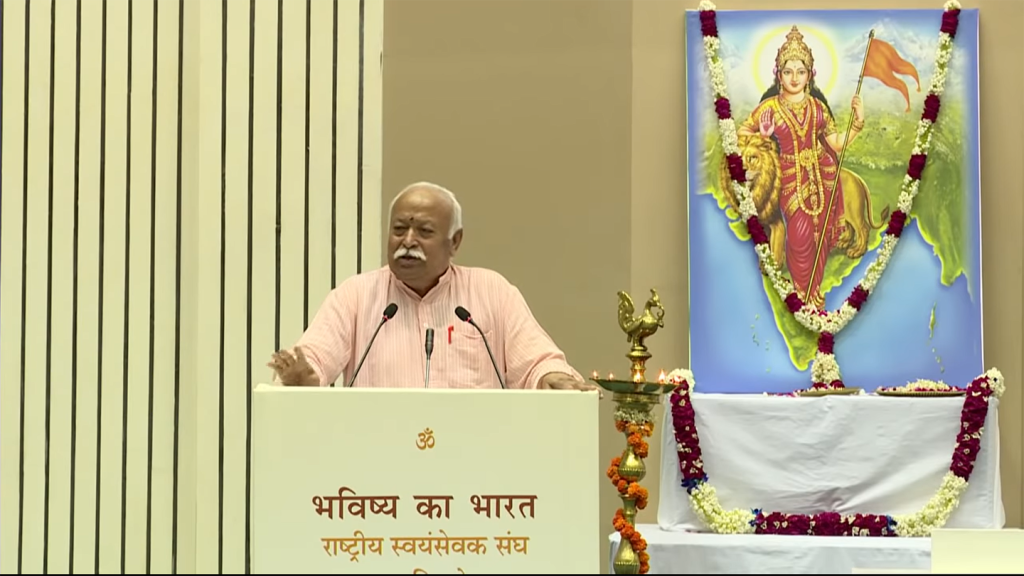Rashtriya Swayamsevak Sangh (RSS), the largest voluntary organisation in the world will turn 100 this year.. From Vijaydashami 2025 until Vijaydashami 2026, the centenary celebrations will take place. The key focus of the RSS will be on further expanding its outreach.
In this context, it is important to understand some of the core issues around which the RSS works, although they are not spelled out exclusively, as there is no single book of ideology that the RSS adheres to. These principles, which guide the organisation’s functioning, can help one understand the objective of the RSS, how it works, and why there has never been any succession issues, unlike most other organisations, even after completing 100 years. These principles have also ensured that the RSS became the largest voluntary organisation in the world, against all odds, and despite not having any formal membership process, millions of its cadres continue to be disciplined and highly motivated to work selflessly for society.
The first core principle of the RSS is that its objective is to organise society and transform it in such a way that every member of society can realise his or her potential in a holistic manner. Thus, the RSS has positioned itself not as an organisation within society, but as a force multiplier that helps society to organise itself.
The second core principle, deduced from the above-mentioned one, is that when society is completely transformed and the RSS’ objective has been achieved, it need not receive any credit because it is the society that has transformed itself. Because of this principle, the RSS stays away from publicity. An interesting fact about the RSS is that its publicity wing (Prachar Vibhag) came into existence in the mid-1980s, almost six decades after its inception. The scope of activities of the RSS publicity wing has been defined in such a way that it is focused on promoting nationalist ideas, rather than the organisation’s achievements or activities.
The third core principle of the RSS is that there are two kinds of people in society: those who have joined the RSS and those who are ultimately going to join the RSS. Senior RSS functionaries have repeatedly said in their internal meetings, as well as on public platforms, that if someone is critical of the RSS, it needs to work harder to reach out to its critics and make them understand what the RSS is all about. That is why, despite being targeted through false narratives by several political leaders, intellectuals, and public personalities, the RSS doesn’t respond with counter-arguments. It believes that, ultimately, its bitter critics will come to its fold. This has happened in the past with several RSS detractors who later joined the organisation and worked for it relentlessly.
To give an example, Prof. MG Bokare, a famous economist, who later became the vice-chancellor of Nagpur University, was a frontline ideologue of the Left parties. However, his friendship with RSS ideologue and stalwart DattopantThengadi led to an exchange of ideas. Thengadi convinced Bokare to study the tradition of economics in ancient Indian scriptures. The outcome was Hindu Economics, a seminal work by Bokare published in 1993. Interestingly, he also became the first national convenor of the Swadeshi Jagaran Manch (SJM), an RSS-inspired organisation that works in the field of public policy, especially on economic issues.
The fourth core principle of the RSS is that its prime instrument of working in society will always be its daily ‘Shakha’. This uniquely devised system organises gatherings of its volunteers at the local level every day at a fixed time and location. The gathering lasts for an hour and there are more than 70,000 shakhas across the country. The RSS sees its shakha as a character-building mechanism. Volunteers, who often join as children or adolescents, are trained every day to think about ‘nation and society’ first.
As they become adults, many of them move on to do social work in their fields of choice, while a significant section stays back in the organisation to strengthen and expand its shakhas. Those who move out either set up organisations or join organisations set up by RSS volunteers earlier in their respective areas of interest. The RSS mentors these organisations and the volunteers who have moved into different fields. This is how more than three dozen national organisations have come into existence, creating a huge impact in almost every field, from education to tribal welfare. Some well-known organisations set up and driven by volunteers who came out of the RSS’ Shakha system include Akhil Bharatiya Vidyarthi Parishad, Sewa Bharati, Vanvasi Kalyan Ashram, Bharatiya Mazdoor Sangh, Vidya Bharati, Vishwa Hindu Parishad, and Pragya Pravah, to name a few.
The plan for the centenary celebrations of the RSS are being woven around these core principles, with a key focus on expanding and strengthening the ‘Shakhas’, the time-tested instrument that has remained unchanged for the organisation ever since its inception in 1925.
